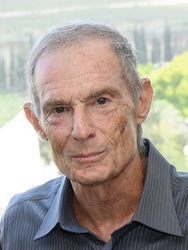The 2019 Felix Klein Award

Tommy Dreyfus
2019 Felix Klein Medal
The Felix Klein Medal, with which ICMI honors the most meritorious members of the mathematics education community, is given in 2019 to Tommy Dreyfus, Professor Emeritus at Tel Aviv University, Israel, in recognition of his life-time achievement. This distinction acknowledges Professor Dreyfus’s contribution to research as well as his leading role in shaping and consolidating the research community and in fostering communication between researchers.
For four decades, Tommy Dreyfus’s research has been systematically deepening our understanding of mathematics learning. Trained as a mathematical physicist, Tommy has been drawing in this work on his deep understanding of mathematics and his first-hand familiarity with ways in which mathematical ideas come into being and evolve. Since the late 1970s and for the next two decades his research has been focusing on students’ conceptualization of mathematical objects such as function, and on the role of intuition, visualization and aesthetics in mathematical thinking. With years, his interests have been gradually shifting from the individual student to learning-teaching processes of the classroom. In the last twenty years, his empirical and conceptual work has been devoted to the study of epistemic activities such as proving and abstracting. These efforts resulted in the theory known as AiC – Abstraction in Context, which he developed with Baruch Schwarz and Rina Hershkowitz. Conceived in the late 1990s, the AiC framework has become increasingly influential. Since its inception, it has generated much empirical research all over the world. The theory has been found to be useful also to teachers, whom it provides with tools for monitoring student learning. As impressive in its scope, breadth, depth and impact as Professor Dreyfus‘s research is, it constitutes only a part of the contribution for which he is honored today with this special distinction. Another outstanding part of his work is his ongoing project of shaping and consolidating the international community of research in mathematics education, a goal that he tries to attain in multiple ways. First and foremost, through his extensive editorial work he has been setting standards and giving directions for research in mathematics education. Particularly influential has been his 30-year long association with Educational Studies in Mathematics, which included his three-year long term as the editor-in-chief. Professor Dreyfus has also been serving in, and shaping, numerous professional organizations, with PME (the international group for the Psychology of Mathematics Education) and ERME (the European Society for Research in Mathematics Education) among them.
In addition, he played key roles in numerous professional committees in Israel, Europe and America. His influence on research and on policy directly affecting mathematics teaching is keenly felt over the world. In all these activities, Professor Dreyfus has been consistently promoting cross-discursive dialogues. He has done this by organizing international meetings, establishing trans-continental collaborative research projects, appearing world-wide as an invited speaker and by extensive mentoring in his own country and beyond. Probably the most important and innovative among Professor Dreyfus’s consolidating activities have been his multifarious efforts to spur and improve communication among researchers working within differing theoretical frameworks. Being concerned about the fragmentation of the field of mathematics education, Professor Dreyfus has been looking for ways in which community members can engage in a productive dialogue across discursive boundaries. These attempts began with his own cross-theoretical research collaborations. It continued with his conceptual work on the possibility of “networking theories”, the activity of employing multiple theories in the attempt to produce a synergetic, cumulative effect. Through these initiatives, Professor Dreyfus has contributed to changing the dominant narratives about theoretical diversity. With his help, the multiplicity of research discourses is now seen less as a problem to solve than as an opportunity to embrace.
Born in Switzerland and now living in Israel, Tommy is fluent in a number of languages, which makes him particularly well equipped for the project of consolidating the international community. After his 1975 doctorate in mathematical physics from the University of Geneva, endowed with several prestigious fellowships and awards, Tommy began visiting universities all over the world. Since then, he never stopped. In parallel to his work at the Weizmann Institute and at the Center for Technological Education in Holon, and later as a full professor of mathematics education at Tel Aviv University, Tommy served as a visiting professor in 14 universities over the world, including in Canada, Germany, Finland, Israel, New Zealand, Norway, Sweden, Switzerland, and the USA. On all these occasions, he spent much time teaching and working with both young and seasoned researchers. By all accounts, he left an indelible mark in all the places he visited.
This owes, among others, to his ability to communicate fluently and easily, to his sensitivity to other cultures and to his general sense of inclusiveness. His willingness to listen and to share his own insights and his devotion to a common effort of understanding and improving mathematics education have touched everyone with whom he has come into contact. Officially retired since 2015, he remains as active and engaged as ever.
To sum up, over the 40 years of his career, Professor Dreyfus has been contributing to our collective endeavor of promoting mathematics education in great many ways: as a researcher, as an editor, as an organizer and policy adviser, and as a teacher and mentor. So far, he has published more than 120 research papers and book chapters, 9 edited volumes, and diverse teaching materials. His writings continue to be read and cited widely, and research programs he initiated or helped establish continue to thrive and inform the field. Even now in his retirement, he continues to shape the field, to foster young researchers and to influence research and policy, both in his own country and abroad. For all this and his many other contributions to our community, Tommy Dreyfus is an eminently worthy candidate for the Felix Klein Award.